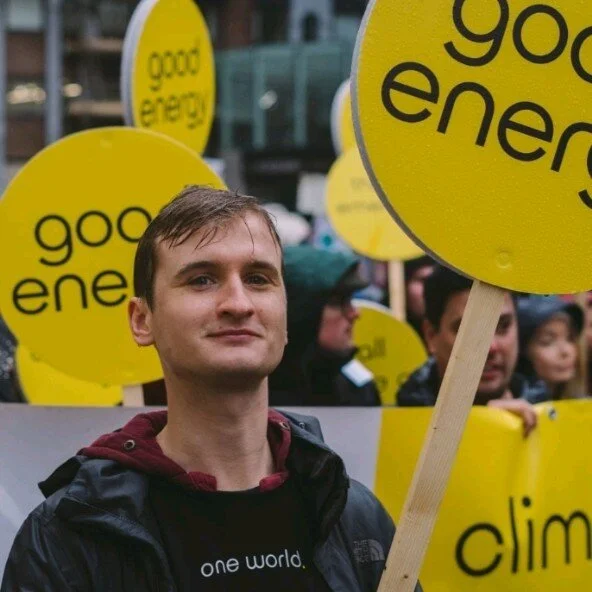The 5Fs: How you can help the climate crisis
Background
This Business Declares event, The 5Fs: How you can help the climate crisis, was held on September 22nd 2021 as part of the Great Big Green Week - a national week of events organised by The Climate Coalition to champion climate action and to show the UK government that people are passionate about the environment and sustainability. A full recording of the event can be found here
Introduction – Ben Tolhurst, Director; Business Declares
The host, Ben Tolhurst, began by highlighting that general awareness of the climate emergency has dramatically increased in recent times, due to a number of key reports (such as from the IPCC) as well as the very visible evidence of more frequent and more extreme climate events. There is now irrefutable evidence of the climate emergency being caused by human activity and that fossil fuel combustion and hence CO2 emissions must be drastically reduced to limit global heating. The immense scale of the climate crisis means that it has to be tackled on 3 fronts - by governments, businesses and everyday citizens.
This event explored what everyday citizens can do to resolve the crisis – focusing on 5 key areas of our day-to-day lives over which we have control to take action and reduce environmental impact.
1. Food - Andy Stephens, Head of Sustainable Food; COOK
Andy highlighted that the National Food Strategy describes the food system as being both a miracle and a disaster – consumers have a huge variety of food to choose from at supermarkets and shops, at the expense of increasing negative environmental impact.
He noted that it is estimated that the food system accounts for a third of all greenhouse gas (GHG) emissions, and half of the world’s habitable land is used for agriculture, which in turn accounts for 80% of tropical deforestation.
The issue is exacerbated by the need to feed an exponentially rising global population (predicted to reach 9 billion by 2050, according to the UN). All the while, a quarter to a third of all food produced is wasted, accounting for 8-10% of GHG emissions.
However, there is some positive news - a recent report from WRAP, a world-leading sustainability charity, has shown that, as a result of the COVID-19 pandemic and lockdowns, 80% of citizens have adopted positive food management behaviours, which led to a 43% reduction in food waste.
Andy highlighted everyday practical solutions which everyone is able to consider adopting. These are:
Writing shopping lists; knowing what’s in your pantry/freezer/fridge
Batch cooking, portioning food for the appropriate number of people to store frozen or refrigerated until needed. Alternatively, food companies such as COOK could do this for you.
Meal planning and taking into account any takeaways or eat-outs into your schedule to avoid wasting food that’s already in your kitchen.
Andy also suggested other practical tips including:
Signing up to apps, such as Olio and Too Good To Go, which connects people and surplus food: for others to use your surplus food in their cooking or vice versa.
Volunteering for charities, such as Food Cycle and FareShare enables charities to deliver surplus food from places where it is not needed to people who need it.
Finding ways of reducing meat consumption that work for you, to meet carbon reduction targets and limit global heating. The National Food Strategy estimates that a 30% reduction in meat consumption by 2030 would be good to aim for.
Ways of reducing meat consumption include signing up to campaigns, such as Meat Free Mondays and Veganuary, utilising veggie cookbooks to challenge yourself to make veggie food taste just as good as their meat alternative.
2. Fashion - Safia Minney MBE, Founder; People Tree & REAL Sustainability, Advisor, Speaker and Author
Safia highlighted that the fashion industry is the second largest polluter in the world and if unchecked, will account for 26% of global carbon emissions by 2050.
Safia also highlighted the following important points relating to the fashion industry:
Over 85% of emissions in this sector are from scope 3, i.e., the supply chain, so any organisation claiming net zero must include this facet in their measurement.
There are issues in the sector around plastics, living wages and water usage - all of which cause wider ecological and social challenges.
There are a number of positives which are happening in the sector – such as second hand fashion, which is becoming mainstream and is predicted to become as big as fast fashion by 2030, through second-hand fashion marketplaces, such as Depop, Vinted, Re Fashion and Grailed. She also highlighted the rise of repair services, which will become more mainstream in the coming years.
Safia highlighted everyday things we can all do:
Drastically cut production and consumption - The most sustainable clothes are the ones which you already have. Switch to buying second-hand items. If buying new clothes, buy ethical, Fair Trade clothes made from recycled synthetics or natural materials (such as organic cotton) and handcrafted that all have a lower impact.
Be audacious and raise awareness amongst friends, family, peers at work; take action and encourage others to do so too!
Avoid buying items made from synthetic materials, such as polyester and nylon, which have to be phased out, due to their impact as microfibres in the environment.
Recycle, repair, swap, rent or upcycle clothes.
3. Flying - Todd Smith, Ex-Pilot and Co-Founder; Safe Landing
Todd highlighted that the aviation sector is on track to increase emissions from 3% of global CO2 emissions to 25% by 2050. He noted that these figures do not include the negative impact of other gases which have a combined heating force up to 3 times greater than CO2 alone.
The vast majority of these emissions are caused by long haul flights and it is the 1% of those who fly who create 50% of emissions. Todd also reminded us that around 80% of the global population have never been on aircraft and therefore flying is very much a privilege, not a right.
Despite various articles on “green flying”, Todd highlighted that there is currently no workable solution to aviation’s impact on the environment. To put the issue into sharp focus he drew from UN figures quoting that in order to be “sustainable” each person needs to stay within a limit of 2 tonnes of CO2 per year. As a point of comparison, one economy passenger return flight from London to Bangkok emits 3.5 tonnes of CO2.
Todd highlighted practical solutions which everyone is able to consider adopting. These are:
Think about your travel choices and their implications on the climate and ecological emergency. Consider whether your flight is essential and whether there is an alternative way to travel which has lower emissions. Consider also when your last flight was and whether you are a frequent flyer and if so how you may reduce the number of flights you take.
Take a flight-free pledge - a pledge to take a year out from flying.
Urge your employer to adopt incentives for low-carbon, sustainable travel, as well as including additional days holiday. There are a number of organisations who specialise in this, such as www.climateperks.com
Visit the Safe Landing website: an aviation worker-led movement to find valid solutions and redefine the meaning of aviation in a post-COVID-19 world amidst the climate crisis. https://safe-landing.org/
4. Fuel - Kit Dixon, Policy and Regulation Manager; Good Energy
Kit highlighted that energy use is one of the largest contributors of GHG emissions in the UK. Energy used for electricity, transport and to heat and cool buildings accounts for two thirds of all UK GHG emissions.
Kit also highlighted that consumers have significant power in making changes in the energy sector, for example by leaving suppliers who don’t provide green energy and urging government to do more to promote sustainable initiatives to fight climate change.
Kit highlighted practical solutions which everyone is able to consider adopting. These are:
“The best unit of energy is the one you don’t need to use at all.” Using less fuel and energy for transport, by walking or cycling instead of driving.
Energy‐efficient upgrades in the home and business, via double glazing and insulation to reduce heat loss.
Using less electricity at certain times of day, e.g. early evening when everyone else is using it.
Self‐generating electricity via solar panels to contribute renewable energy into the National Grid for you and everybody to use. This reduces the strain placed on the National Grid itself, which in turn reduces energy bills, is more efficient, emits less CO2 and is hence better for the climate.
Where power is required from the grid, find a genuinely renewable electricity supplier. Ensure that electricity suppliers use your money to generate their own renewable power or buy renewable power from renewable energy generators, and input the same amount of power you use back into the National Grid.
Caveat: be wary of greenwash from companies who claim to sell 100% renewable energy but don’t buy any power from renewable energy generators and sell brown power (coal, oil, gas) as renewable. To address this, ask your supplier how much power they buy directly from renewable generators or generate themselves.
5. Finance - David Hayman, Campaign Director; Make My Money Matter
David highlighted that the financial sector and its impact are often neglected as a possible avenue to drive more impactful sustainable development. It is often not in people’s consciousness that their own money, savings, pensions and bank accounts are used to invest in companies who implement good and bad causes which shape the world we live in.
In fact, in the UK, £3 trillion is invested in the pensions industry ($50 trillion globally) – which is money that belongs to us as individuals, not financial institutions or corporate companies, so we should have a say about how that money is invested. According to research by Make My Money Matter, moving savings from a default bank account or pension to a greener, ethical bank has 21 times more impact than giving up flying and becoming a vegetarian combined.
David highlighted practical solutions which everyone is able to consider adopting. These are:
Find out where your money is invested, the impact it has and whether this aligns with your values. If you’re not happy with what you find - lobby your pension provider to change for the better or find a sustainable bank or pension scheme which better aligns with your values.
Talking about money, finance and pensions more often with friends and family because it is a misunderstood topic, which is otherwise extremely powerful.
Urge your employer to explore where the company pensions scheme is invested and check whether this aligns with your sustainability strategies. Urge them also to sign up to the Green Pensions Charter.
Questions & Answers
A summary of the Q&A session is provided below:
Food: Are food miles the most important factor in helping reduce emissions in the food industry or is it not as simple as that/more complicated than that?
Andy Stephens commented that it is more complicated than just food miles, but buying locally/seasonal fruit/veg can have a bigger positive impact and is a good way to go. E.g. tomatoes grown in winter (requires lots of energy for greenhouses), but transporting them from Spain - might have a lower carbon impact. The food industry should be examined holistically.
Fashion: How could retailers be regulated to create more ethical fashion?
Safia Minney drew parallels with the traffic light system with food, commenting that the same could be used in the fashion industry. She highlighted that more rigour is needed for (already existing) legislation around greenwash, modern slavery, transparency and director duties. She also highlighted that carbon taxation could be introduced.
Flying: Is Jet-zero possible? And should frequent flyers be taxed?
On the subject of Jet Zero, Todd Smith said that this is not possible. He commented that ‘Jet-zero’ is a clever marketing scheme. He noted the existence of so-called ‘sustainable aviation fuel’. But in reality, there is insufficient stock available of this fuel globally and it’s 8 times the cost of kerosene. In general though, terms such as “Sustainable aviation fuel”/ “biofuel” are misleading misinformation which worsens environmental damage even further.
On the subject of whether frequent flyers should be taxed, Todd agreed, as well as recommending a tax on kerosene (jet fuel). This tax income could be spent on more sustainable social and ecological initiatives, such as insulation, retrofitting, public transport and social care.
Fuel: How do you choose genuinely renewable/sustainable energy suppliers and avoid greenwashing?
Kit Dixon highlighted that individuals should ask their (prospective) energy supplier how much of the electricity they supply is procured directly from renewable energy generators. If separately-purchased certificates are issued, this is a cause for concern.
In terms of greenwashing in the energy industry, Kit highlighted this is a major cause of concern. He highlighted that every time a unit of green energy is created, a certificate is issued to that generator, which can sell the power and certificate separately. So in theory, an energy supplier could buy all their power from a gas plant but buy certificates separately to label their power as ‘green energy’.
Finance: How do we know which pension provider is good/provides ethical sustainable development?
David Hayman commented that consumers need to challenge their pension providers to demonstrate that they are committing to very robust, ambitious net zero targets, or show really good progress on the climate agenda. There is more advice on the Make My Money Matter website referenced later.
Ed Grattan from Triodos Bank (Green, ethical, sustainable bank) also noted that green finance is equally applicable to current account, savings, stocks and shares, investments. Tools such as the Ethical Consumer Magazine provide leading assessments and research in finance & other areas, alongside other tools such as Bank.green and switchit.money, which provide individuals with information and advice on how their banks are doing and which banks heavily invest in fossil fuels and climate negative activities. He also urged people to write to their banks or switch to a better bank and tell them about their reasons behind this.
Resources and Key Links
Food
Riverford’s vegetarian and vegan recipes: https://www.riverford.co.uk/recipes
Signing up to COOK’s veg-e-mail: https://www.cookfood.net/menu/main-meals/vegetarian-meals for more information on COOK’s vegetarian and vegan food and how you can move to a plant-based diet.
Fashion
REAL Sustainability: www.realsustainability.org
Fashion Revolution: https://www.fashionrevolution.org/
Flying
Safe Landing: https://safe-landing.org/
Climate Perks: www.climateperks.com
Fuel
Good Energy: www.goodenergy.co.uk/
‘Greenwashing information’ Greenwashing energy: REGOs and fake green tariffs | Good Energy
Finance







